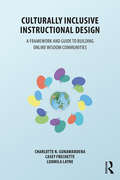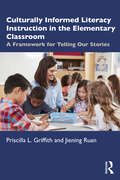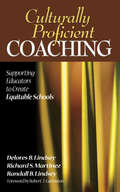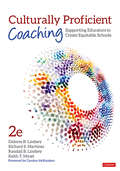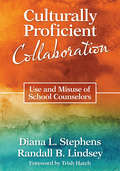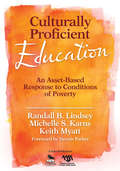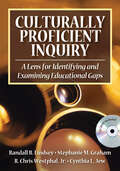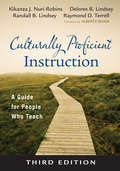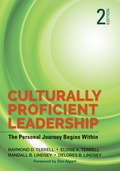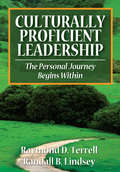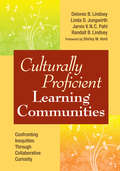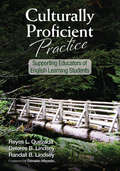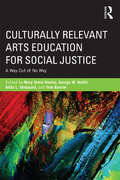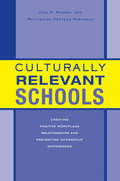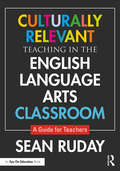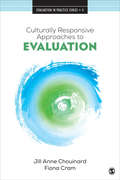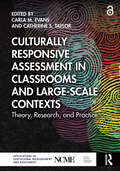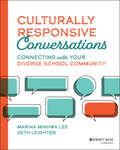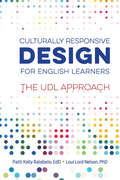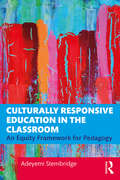- Table View
- List View
Culturally Inclusive Instructional Design: A Framework and Guide to Building Online Wisdom Communities
by Casey Frechette Charlotte Gunawardena Ludmila LayneWINNER OF THE 2019 OUTSTANDING BOOK AWARD FROM AECT'S DIVISION OF DISTANCE EDUCATION! As online courses and digital learning enable more people from more places to learn together, it is crucial for instructional design to incorporate diverse cultural perspectives. Culturally Inclusive Instructional Design provides a framework for thinking about culture in digital learning, offering insight into how to build inclusive online communities that encourage reflection and growth, regardless of content domain. Chapters cover the foundation, components, and implementation of the authors’ Wisdom Communities (WisCom) framework, which enables learners from global backgrounds to experience long-lasting, transformative learning through real-world problem-solving. This book is a timely, resourceful guide to building truly collaborative, inquiry-based online learning experiences.
Culturally Informed Literacy Instruction in the Elementary Classroom: A Framework for Telling Our Stories
by Jiening Ruan Priscilla L. GriffithThis text introduces an original, scalable instructional framework called Telling Our Stories (TOS), an approach for supporting culturally informed literacy instruction in the elementary classroom. Connecting the theory to practice, the TOS framework centers the cultural heritage and experiences of students and offers a roadmap to scientifically and pedagogically sound instruction. Aligned with current curriculum standards, chapters feature authentic examples and case studies, reflection questions, and writing activities that will foster a culture of inclusion, community, and academic rigor. The many practical strategies promote students’ learning and appreciation of diversity through academic reading and writing as well as positive school-family and school-community relations. Readers will come away with new ideas, tools, and a thorough understanding of how to integrate culturally informed practices in ways that support the learning of all children. Accessible and comprehensive, this is an essential text for pre-service teachers in courses on ELA methods and literacy instruction, as well as practicing teachers.
Culturally Proficient Coaching: Supporting Educators to Create Equitable Schools
by Delores B. Lindsey Randall B. Lindsey Richard S. MartinezGet the solution to the equity equation: cultural insight plus coaching! To arm educators with the tools necessary to close the achievement gap, this straightforward guide blends the Five Essential Elements of Cultural Proficiency with the Five States of Mind of Cognitive CoachingSM. It offers a practical strategy for being mindfully attuned to—and leveraging—cultural diversity to optimize student learning. Boosting educators’ cultural confidence and consciousness while honing their coaching skills, this interactive resource features: Action-planning worksheets Reflective questions Coaching maps and conversation vignettes Real-life examples through a composite case story
Culturally Proficient Coaching: Supporting Educators to Create Equitable Schools
by Delores B. Lindsey Randall B. Lindsey Keith T. Myatt Richard S. MartinezWhy a new edition of Culturally Proficient Coaching? Why now, especially? Because several polarizing years later, there&’s even greater urgency for us all to critically examine our attitudes, beliefs, and practices when working with students who look or sound &“different.&” No matter how broadly you define coach, no matter which coaching model you follow, this is the resource to help you get started. With the first edition, the authors&’ big goal was to shift our thinking in service of standards-based teaching and leading, and equitable interactions that support all students achieving at highest levels. Now, with this second edition, the authors add a third goal: to encourage a more holistic mindset and expanded contextual uses. New features include: Enhanced research on the effectiveness of coaching in educational settings New data on response to implicit bias and microaggressions--subtle and unintentional, yet destructive, forms of discrimination that continue to marginalize Refinement and updating of the Tools of Cultural Proficiency, which enable you to provide equitable life-affirming experiences to all cultural groups Expanded models of Culturally Proficient Coaching Conversations A special section on crafting Breakthrough Questions to shift entrenched mindsets and barriers to Cultural Proficiency By design, Culturally Proficient Coaching is an intentional, inside-out approach that mediates a person&’s thinking toward values, beliefs, and behaviors that enable effective cross-cultural interactions and equitable learning environments. Here&’s your opportunity to serve as that expert and trusted mediator, boosting educators' cultural confidence and consciousness, while honing their coaching skills. "We owe it to ourselves and to our children to productively embrace and engage diversity, with all of its tensions, for the sustainability of humanity. These authors have given us the invitation, the road map, and the call to action. the embarkment is up to each one of us." --Carolyn M. McKanders, Director Emeritus Center for Adaptive Schools and Thinking Collaborative
Culturally Proficient Coaching: Supporting Educators to Create Equitable Schools
by Delores B. Lindsey Randall B. Lindsey Keith T. Myatt Richard S. MartinezWhy a new edition of Culturally Proficient Coaching? Why now, especially? Because several polarizing years later, there&’s even greater urgency for us all to critically examine our attitudes, beliefs, and practices when working with students who look or sound &“different.&” No matter how broadly you define coach, no matter which coaching model you follow, this is the resource to help you get started. With the first edition, the authors&’ big goal was to shift our thinking in service of standards-based teaching and leading, and equitable interactions that support all students achieving at highest levels. Now, with this second edition, the authors add a third goal: to encourage a more holistic mindset and expanded contextual uses. New features include: Enhanced research on the effectiveness of coaching in educational settings New data on response to implicit bias and microaggressions--subtle and unintentional, yet destructive, forms of discrimination that continue to marginalize Refinement and updating of the Tools of Cultural Proficiency, which enable you to provide equitable life-affirming experiences to all cultural groups Expanded models of Culturally Proficient Coaching Conversations A special section on crafting Breakthrough Questions to shift entrenched mindsets and barriers to Cultural Proficiency By design, Culturally Proficient Coaching is an intentional, inside-out approach that mediates a person&’s thinking toward values, beliefs, and behaviors that enable effective cross-cultural interactions and equitable learning environments. Here&’s your opportunity to serve as that expert and trusted mediator, boosting educators' cultural confidence and consciousness, while honing their coaching skills. "We owe it to ourselves and to our children to productively embrace and engage diversity, with all of its tensions, for the sustainability of humanity. These authors have given us the invitation, the road map, and the call to action. the embarkment is up to each one of us." --Carolyn M. McKanders, Director Emeritus Center for Adaptive Schools and Thinking Collaborative
Culturally Proficient Collaboration: Use and Misuse of School Counselors
by Randall B. Lindsey Diana L. StephensOptimize school counselors and raise your school’s cultural competence The authors make a compelling case for recognizing professional school counselors as leaders of 21st-century change rather than "gatekeepers" of the status quo. Today’s school leaders need to acknowledge counselors’ value in the necessary work of providing equitable resources and opportunities for children in today’s multicultural environment. Aligned with the American School Counselor Association National Model for school counseling programs, this book provides a conceptual framework and practical protocols for utilizing school counselors as: Change agents for school improvement Creators of results-based programs Equity advocates for all students This book shows how to make the most of school leadership teams by empowering counselors to contribute to each school’s success.
Culturally Proficient Education: An Asset-Based Response to Conditions of Poverty
by Randall B. Lindsey Michelle S. Karns Keith T. MyattDevelop culturally proficient policies and practices that create opportunities for students of poverty! Countering the perspective that students from poverty come to school with deficits that prevent them from learning, this resource offers educators the knowledge and skills to maximize educational opportunities for all students, independent of students’ socioeconomic status. Using the framework of cultural proficiency, this guide features: An examination of how poverty intersects with other groupings, including race, ethnicity, and language acquisition Research-based teaching strategies that draw on student strengths and assets Vignettes and case studies Reflective activities for understanding your own assumptions and values regarding equity
Culturally Proficient Inclusive Schools: All Means ALL!
by Delores B. Lindsey Jacqueline S. Thousand Cynthia L. Jew Lori R. PiowlskiCreate inclusive educational environments that benefit ALL learners! As schools become more diverse with students of differing abilities and needs, this self-reflective and action-oriented guide helps you create and support more inclusive schools and classrooms that intentionally educate all students. Using the Five Essential Elements of Cultural Proficiency as a roadmap, this book presents: Students’ learning differences as just that – differences rather than deficits Strategies that show you how to break though the common barriers to culturally proficient and inclusive schooling Assessments that gauge your awareness and show you how to best serve every student’s needs
Culturally Proficient Inclusive Schools: All Means ALL!
by Delores B. Lindsey Jacqueline S. Thousand Cynthia L. Jew Lori R. PiowlskiCreate inclusive educational environments that benefit ALL learners! As schools become more diverse with students of differing abilities and needs, this self-reflective and action-oriented guide helps you create and support more inclusive schools and classrooms that intentionally educate all students. Using the Five Essential Elements of Cultural Proficiency as a roadmap, this book presents: Students’ learning differences as just that – differences rather than deficits Strategies that show you how to break though the common barriers to culturally proficient and inclusive schooling Assessments that gauge your awareness and show you how to best serve every student’s needs
Culturally Proficient Inquiry: A Lens for Identifying and Examining Educational Gaps
by Lindsey, Randall B., Graham, Stephanie M., Westphal, R. Chris Jr., and Jew, Cynthia L."What is best about this remarkable book is its constant reminder that the courage to do what is just and right for the ′underserved′ comes to those who face the ′brutal facts,′ listen to the difficult questions, and seek support and guidance from educators in the field. This book is an inspiring companion needed now more than ever."—Sidney Morrison, PrincipalHoward Wood Elementary School, Torrance, CA"Provides the information and tools needed to create powerful learning communities in which the academic and co-curricular needs and the well-being of all students are addressed through purposeful inquiry and culturally proficient practices. This text is a must-read for educational leader preparation programs and for all educational leaders who want to make a difference."—Linda Purrington, Director, Educational Leadership AcademyPepperdine UniversityUse inquiry to promote equity and transform your school′s educational environment!Imagine improving student and teacher performance and enriching the culture in your school while implementing deeper goals for educational equity and long-term success. Using the lens of cultural proficiency, the authors lead practitioners through the process of gathering and analyzing data to meet the needs of historically underserved students. This book provides educators with a critical evaluation process and rubrics to examine why some students are not being educated to their full potential. The chapters carefully guide readers through the steps of analyzing and using data to:Encourage discussions about promoting educational equity for all studentsCreate a realistic picture of the cultural and economic diversity of your schoolInitiate authentic systemic changeEffectively respond to NCLB legislative mandatesWith a CD-ROM of tables and spreadsheets for data entry, Culturally Proficient Inquiry provides a model for framing professional conversations and making data-based decisions to ensure that all children receive the education they deserve.
Culturally Proficient Instruction: A Guide for People Who Teach
by Delores B. Lindsey Randall B. Lindsey Kikanza Nuri-Robins Raymond D. TerrellAre you doing all you can to improve teaching and learning?Culturally proficient instruction is the result of an inside-out journey of teaching and learning during which you explore your values and behaviors while evaluating the policies and practices of your workplace. The journey deepens your understanding of yourself and your community of practice. In the newest version of their best-selling book, the authors invite you to reflect on how you engage with your students and your colleagues as a community of learners. The third edition features a case study to show cultural proficiency in practice and: An updated discussion of standards-based education guidelinesA conceptual framework for the tools of cultural proficiencyNew language for understanding the microaggressions of dominant cultures An integrated guide for use with study groupsEach chapter contains reflective activities and group work conducive to collaborative professional development. Culturally Proficient Instruction is invaluable for anyone dedicated to creating an environment in which all learners can succeed.
Culturally Proficient Leadership: The Personal Journey Begins Within
by Delores B. Lindsey Randall B. Lindsey Dr Raymond D. Terrell Eloise K TerrellBecoming a culturally proficient leader requires the kind of courage, clarity, and insight that can only come from looking inward first. It’s a personal learning journey of will and skill, and if you’re up to the challenge, one that will change how you see your school, your students, and yourself as you build your own cultural competence. Consider this second edition of Culturally Proficient Leadershipyour personal road map for navigating that journey. Each chapter of Culturally Proficient Leadership invites you to put your experiences up front and challenges you to reframe your story based on multiple viewpoints—now, notably, with the addition of new coauthors Delores Lindsey and Eloise Kemp Terrell, who have their own remarkable stories and insight to share. Overall, all four authors will help you answer the critical question “Is what we say what we do?” utilizing the tools of Cultural Proficiency to engage in Reflections and Cultural Interviews to explore what you learn about those who are culturally different from you develop a Cultural Autobiography to provide a picture of the cultural memberships that have influenced who you are as a person use the Cultural Proficiency Continuum to examine your progress as a leader in serving your students and communities prepare an intentional Leadership Plan that summarizes your journey from Cultural Precompetence to Cultural Proficiency The central “inside-out” premise of Cultural Proficiency is that engaging in deep introspection around one’s personal beliefs, values, and behaviors in response to human differences is the first step toward systemic educational reform. We invite you to embark on this journey of self-awareness, of moral courage, and of the life-affirming power of human diversity. “I believe deeply that we cannot solve the challenges of our time unless we solve them together—unless we perfect our union by understanding that we may have different stories, but we hold common hopes; that we may not look the same and may not come from the same place, but we all want to move in the same direction: toward a better future for our children and our grandchildren.” —Barack Obama, Los Angeles Times, 2008
Culturally Proficient Leadership: The Personal Journey Begins Within
by Delores B. Lindsey Randall B. Lindsey Dr Raymond D. Terrell Eloise K TerrellBecoming a culturally proficient leader requires the kind of courage, clarity, and insight that can only come from looking inward first. It’s a personal learning journey of will and skill, and if you’re up to the challenge, one that will change how you see your school, your students, and yourself as you build your own cultural competence. Consider this second edition of Culturally Proficient Leadershipyour personal road map for navigating that journey. Each chapter of Culturally Proficient Leadership invites you to put your experiences up front and challenges you to reframe your story based on multiple viewpoints—now, notably, with the addition of new coauthors Delores Lindsey and Eloise Kemp Terrell, who have their own remarkable stories and insight to share. Overall, all four authors will help you answer the critical question “Is what we say what we do?” utilizing the tools of Cultural Proficiency to engage in Reflections and Cultural Interviews to explore what you learn about those who are culturally different from you develop a Cultural Autobiography to provide a picture of the cultural memberships that have influenced who you are as a person use the Cultural Proficiency Continuum to examine your progress as a leader in serving your students and communities prepare an intentional Leadership Plan that summarizes your journey from Cultural Precompetence to Cultural Proficiency The central “inside-out” premise of Cultural Proficiency is that engaging in deep introspection around one’s personal beliefs, values, and behaviors in response to human differences is the first step toward systemic educational reform. We invite you to embark on this journey of self-awareness, of moral courage, and of the life-affirming power of human diversity. “I believe deeply that we cannot solve the challenges of our time unless we solve them together—unless we perfect our union by understanding that we may have different stories, but we hold common hopes; that we may not look the same and may not come from the same place, but we all want to move in the same direction: toward a better future for our children and our grandchildren.” —Barack Obama, Los Angeles Times, 2008
Culturally Proficient Leadership: The Personal Journey Begins Within
by Randall B. Lindsey Dr Raymond D. TerrellGain the personal insight you need to promote equity in your school! To develop a high-performing school, educators must be able to lead and communicate across cultures. This interactive guide helps leaders recognize their underlying cultural beliefs and strengthen their leadership skills through personal reflection. The book’s content: Addresses a broad range of differences relevant to today’s schools, including race, ethnicity, national origin, language, gender, social class, sexual orientation, faith, and ability Features compelling first-person narratives from the authors’ own cross-cultural journeys Includes reflective questions and prompts to guide readers in examining how their cultural experiences influence their leadership practice
Culturally Proficient Learning Communities: Confronting Inequities Through Collaborative Curiosity
by Delores B. Lindsey Randall B. Lindsey Linda D. Jungwirth Jarvis V.N.C. PahlClose the achievement gap with equity-focused professional learning communities! Integrating the four Tools of Cultural Proficiency with the PLC framework, this relevant guide offers school leaders, district administrators, and staff developers a collaborative approach to address bias and inequity. The authors discuss the impact of our history on cultural understanding and provide a wealth of practical strategies and tools for building equity-focused PLCs, including: Templates, protocols, activities, and rubrics for deconstructing inequity in student achievement Stories, tools, and thinking prompts to guide an inside-out transformation toward cultural proficiency An extended example of one school district’s journey
Culturally Proficient Practice: Supporting Educators of English Learning Students
by Delores B. Lindsey Randall B. Lindsey Reyes L. QuezadaHelp your English learning students achieve academic success! Designed to empower educators to become agents of change in their classrooms, schools, and communities, this guide introduces the principles of Cultural Proficiency and how they can help improve educators’ ability to effectively teach English language learners. This book features: <p><p> Activities that build core Cultural Proficiency skills and promote personal transformation <p> A chapter-by-chapter rubric for working effectively with English learning students <p> A conversation-starting case story featuring the River View School District <p> Strategies for using action research to improve the success of English learning students
Culturally Relevant Arts Education for Social Justice: A Way Out of No Way
by George W. Noblit Tom Barone Mary Stone Hanley Gilda L. SheppardA groundswell of interest has led to significant advances in understanding and using Culturally Responsive Arts Education to promote social justice and education. This landmark volume provides a theoretical orientation to these endeavors. Examining a range of efforts across different forms of art, various educational settings, and diverse contexts, it foregrounds the assets of imagination, creativity, resilience, critique and cultural knowledge, working against prevailing understandings of marginalized groups as having deficits of knowledge, skills, or culture. Emphasizing the arts as a way to make something possible, it explores and illustrates the elements of social justice arts education as "a way out of no way" imposed by dominance and ideology. A set of powerful demonstrations shows how this work looks in action. Introductions to the book as a whole and to each section focus on how to use the chapters pedagogically. The conclusion pulls back the chapters into theoretical and pedagogical context and suggests what needs done to be done practically, empirically, and theoretically, for the field to continue to develop.
Culturally Relevant Schools: Creating Positive Workplace Relationships and Preventing Intergroup Differences
by Jean A. Madsen Reitumetse Obakeng MabokelaThe authors provide teachers and school leaders concrete suggestions to address workplace relationships; to respond to intergroup conflict; to create positive exchanges among different ethnic groups of teachers; and to create a strategic process to address diversity issues.
Culturally Relevant Teaching in the English Language Arts Classroom: A Guide for Teachers
by Sean RudayThis book is a practical, research-based, classroom-ready resource for English language arts teachers interested in learning how to incorporate culturally relevant pedagogy into all aspects of their instruction, including writing, reading, and vocabulary lessons. It also provides suggestions for building an inclusive classroom environment in which all students’ backgrounds are valued. Topics covered: Writing strategies and diverse texts Dialect and student writing Applying reading strategies to texts that represent diverse backgrounds Using reading strategies in out-of-school contexts Considering students’ funds of knowledge and language awareness Connecting linguistic diversity to word-root instruction Building an inclusive classroom environment The appendix features several useful tools, including a study guide, a comprehensive list of suggested texts, recommendations for parent communication, and reproducible tools for the classroom. The study guide and reproducibles are available for free download from our website at www.routledge.com/9781138393318.
Culturally Responsive Approaches to Evaluation: Empirical Implications for Theory and Practice (Evaluation in Practice Series #4)
by Fiona Cram jill ChouinardEvaluators have always worked in diverse communities, and the programs they evaluate are designed to address often intractable socio-political and economic issues. Evaluations that explicitly aim to be more responsive to culture and cultural context are, however, a more recent phenomenon. In this book, Jill Anne Chouinard and Fiona Cram utilize a conceptual framework that foregrounds culture in social inquiry, and then uses that framework to analyze empirical studies across three distinct cultural domains of evaluation practice (Western, Indigenous and international development). Culturally Responsive Approaches to Evaluation provide a comparative analysis of these studies and discuss lessons drawn from them in order to help evaluators extend their current thinking and practice. They conclude with an agenda for future research.
Culturally Responsive Approaches to Evaluation: Empirical Implications for Theory and Practice (Evaluation in Practice Series #4)
by Fiona Cram jill ChouinardEvaluators have always worked in diverse communities, and the programs they evaluate are designed to address often intractable socio-political and economic issues. Evaluations that explicitly aim to be more responsive to culture and cultural context are, however, a more recent phenomenon. In this book, Jill Anne Chouinard and Fiona Cram utilize a conceptual framework that foregrounds culture in social inquiry, and then uses that framework to analyze empirical studies across three distinct cultural domains of evaluation practice (Western, Indigenous and international development). Culturally Responsive Approaches to Evaluation provide a comparative analysis of these studies and discuss lessons drawn from them in order to help evaluators extend their current thinking and practice. They conclude with an agenda for future research.
Culturally Responsive Assessment in Classrooms and Large-Scale Contexts: Theory, Research, and Practice (NCME APPLICATIONS OF EDUCATIONAL MEASUREMENT AND ASSESSMENT)
by Catherine S. Taylor Carla M. EvansCulturally Responsive Assessment in Classrooms and Large-Scale Contexts explores how scholars and professionals in educational measurement and assessment can use the unique cultural and social identities of students to shape assessment purpose, design, implementation, use, and validation processes. Despite the sheer diversity of student populations in the United States, the tools used to understand their performance and progress have not substantively changed in decades. Large-scale testing and related policies still privilege “culturally neutral” test content, standardization, and comparability. Classroom assessments often mimic these procedures, even though rich tasks and activities could easily be incorporated into curriculum and instruction to allow students to see themselves, their interests, communities, beliefs, and backgrounds represented and valued. This book collects the theory, research, and best practices that are essential to ensuring cultural responsiveness in classroom assessment and standardized testing procedures, policies, and practices. Chapters by assessment and measurement experts along with scholars who are experts in sociocultural learning theory, philosophy of education, critical theories, multilingual education, and Indigenous education, summarize findings from existing research and suggest how future research can move classroom and industry practice as well as federal, state, and local policy forward.
Culturally Responsive Conversations: Connecting with Your Diverse School Community
by Marina Minhwa Lee Seth LeightonA strategic handbook for educators and administrators serving increasingly multicultural classrooms In Culturally Responsive Conversations, longtime cultural inclusion educators Marina Lee and Seth Leighton deliver an eye-opening discussion of how to develop better relationships and improve learning outcomes in a student body that’s growing increasingly culturally diverse. In the book, readers will explore practical strategies to improve the K-12 educational experience for everyone, including cultural groups who have historically been overlooked or marginalized. This book provides a usable toolkit for educators to have more effective conversations with families from multicultural backgrounds and give all students the educational experience that they deserve. The authors tackle historical models for educating immigrants in the United States while identifying the many stakeholders in the education system and how familial involvement shapes and impacts student achievement. Readers will also find: Interactive self-practice exercises, along with extensive references for additional study Expansive treatments of effective cultural communication and the barriers that prevent teachers and students from achieving it Explanations of how teacher-parent communication can be impacted by cross-cultural talkAn unmatched resource for educators, administrators, and K-12 school leaders, Culturally Responsive Conversations also belongs on the bookshelves of parents, families, and community members hoping to advance the cause of diverse, equitable, and inclusive schools for all.
Culturally Responsive Design for English Learners: The UDL Approach
by Patti Kelly Ralabate Loui Lord NelsonThe cultural and linguistic diversity of students is on the rise, and educators want to know the most effective ways to teach English language learners (ELLs). Two research-based frameworks—Universal Design for Learning (UDL), which addresses the innate brain-based differences of learners, and Culturally Responsive Teaching (CRT), a pedagogy that responds to learners' cultural differences—can help. In this important new book, UDL experts and bestselling authors Patti Kelly Ralabate and Loui Lord Nelson offer a unique lesson planning process that blends UDL and CRT so that educators can proactively meet the learning needs of ELLs. This essential new resource offers scenarios, summaries, reflection questions, and classroom-based exercises to support responsive instruction. Learn to design and craft goals, methods, materials, and assessments that help ELLs optimize their educational experience.
Culturally Responsive Education in the Classroom: An Equity Framework for Pedagogy
by Adeyemi StembridgeThis exciting book helps educators translate the concept of equity into the context of pedagogy in the K-12 classroom. Providing a practice-oriented framework for understanding what equity entails for both teachers and learners, this book clarifies the theoretical context for equity and shares rich teaching strategies across a range of content areas and age groups. Unpacking six themes to understand Culturally Responsive Education (CRE), this powerful book helps teachers incorporate equity into behaviors, environments, and meaningful learning opportunities. Culturally Responsive Education in the Classroom provides specific, practice-based examples to help readers develop a culturally responsive pedagogical mindset for closing equity gaps in student achievement.
